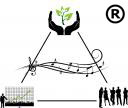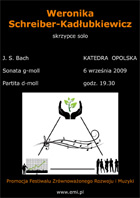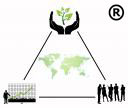Sustainable Development – Preliminary Information
Wanda Pazdan
27 Sep 2007
Sustainable development implies all areas of our existence, both physical and spiritual. Integral understanding of the world, integral philosophy and music may prove to be helpful for us. Philosophers treat reality in different ways. Those who write that reality as we perceive it has impact on us and that we have impact on it – seem to be right. The way we interact with it has impact on the way reality interacts with us… Great physicist, Albert Einstein, said that imagination is more important than knowledge. Władysław Reymont wrote that reality is built from the same material our dreams are built. Methods of strategic management based on the vision suggest an active creation of reality. Spirituality of a human being constitutes the feature which has recently grown to an idea of all-powerful energy. Human beings, depending on the way they manage their spiritual potential, may be profuse sources of goodness or evil, both to themselves and to their environment. Individuals’ own efforts in cooperation with creative energy may change man’s history, about which Herbert George Wells wrote that it is becoming more like a race between education and a catastrophe…Polish environmental law provides the following definition: sustainable development is a social and economic development in which political, economic and social activities are integrated with maintenance of ecological balance and permanence of basic natural processes so that the possibility to satisfy basic needs of individual communities or citizens of the current and future generations is safeguarded.Often, the definition created by UN agencies is applied: “sustainable development is the social and economic development in which integration of political, economic and social activities takes place both in time and space, so that natural balance and permanence of basic natural processes is ensured.” [translated from Polish]In 1987, a concept of sustainable development, defined as “development protecting the needs of the current generation, without limiting implementation of the needs of future generations” entered the international political scene. The European Union gives special emphasis in its acts of law to implementation of environment protection issues into economic and social policies and strategies. Environmental protection – through integration of policies and strategies both in the area of economy and social issues, but also by emphasizing harmonization of actions in time and space – is also stressed in the provisions of the negotiated Constitution of the European Union.The Web site of the company Wanda Pazdan will promote sustainable development management, also treating family and development of individual units as important components of development. The bigger the number of people going along the path of sustainable development, the easier its implementation.M. Nowicki and L. Ribbe, in the last chapter of the book “Problemy Ekorozwoju Polski” [Problems of Eco-development of Poland], entitled “Jaka czeka nas przyszłośc?” [What is Our Future?], wrote: “Settlement dispersion and inflow of people representing various professions into the areas that used to be exclusively rural, should stimulate development of self-government, facilitate many positive citizen initiatives and election of local authorities by making an informed decision rather than voting for anonymous persons. Even now there are no technical obstacles to bringing back an ancient form of direct democracy, as thanks to computer networks and electronic mail it would be possible to conduct voting in form of general referenda on every matter which is vital for society. This pertains to local communities and the society of the whole country. It will create completely new forms of ruling and responsibility of those who rule. Political parties, which so readily refer to a mandate granted them by society, unlike today, will have to take face immediate verification of their actions, without waiting for next elections. Manipulation of opinion polls, based on a very small sample, which now are often an element of political game, will not be possible.”Reliable, “INTEGRATABLE” information made available to EVERYBODY is an indispensable element for implementation of development through sustainable development route. Information brings responsibility. Implementation of sustainable development requires universal responsibility. Business responsibility is no longer a slogan. Now, it involves actions. We have CR (corporate responsibility) and CSR (corporate social responsibility) pilot projects, we have FTSE4Good Index Series created to strengthen awareness and acceptance of socially responsible investments in international business, the process of ISO 14000 and EMAS system implementation is under way.Unification of the form and information scope of a report submitted by an enterprise management board to a commercial court for the preceding year (together with financial statements and notes to financial statements) is the product of international efforts by the Global Reporting Initiative (GRI) (see www.globalreporting.org ). The GRI, in a comprehensive way, highlights areas of business impact on society and the environment, as well as on other business representatives.Quotation from the HOPE project “…we must decide for a life with the feeling of universal responsibility, identifying ourselves with the global and our local communities. We are, at the same time, representatives of many nations and of one world, which are interrelated. Everybody shares responsibility for the current and future welfare and prosperity of the human family and for the greater, living world. The spirit of solidarity and kinship with life as a whole is stronger when we live by giving some of the mystery of life, being grateful for the gift of life and recognizing with humility the place of human beings in the world of nature. We urgently need a common vision of basic values which will ensure ethical foundations of an emerging world community.” [translated from Polish]S. Kozłowski “EKOROZWÓJ Wyzwanie XXI wieku” [ECO-DEVELOPMENT: Challenge of the 21st Century], in the last chapter entitled “Wyzwania XXI wieku” [Challenges of the 21st Century] wrote, among other things, about eco-capitalism. Here is a short citation: “Capitalism needs new strategies. Use of market mechanisms for preservation of the natural environment and, at the same time, creation, for each participant of the market, of an opportunity to cash in on it, is a must. This new thought pattern and direction for actions is called eco-capitalism (Wizsacker, Lovins, Lovins, 1999):
Principles of eco-capitalism:
1. Make sure assessments tell ecological truth.
2. First, do what is most profitable.
3. Invest in conserving the resources as this is cheaper than exploitation of resources.
4. Make markets for the conserved resources.
5. Promote fair competition.
6. Reward only desirable, not undesirable behaviors.
7. Tax what is less desirable rather than desirable.
8. Speed up withdrawal of ineffective equipment.Implementation of the assumptions of eco-capitalism is possible if we change our ideas about prosperity. Until now, prosperity has been commonly assessed through the value of the gross domestic product (GDP), i.e. turnover value. The GDP value often depends on the scale of mismanagement of earth’s resources, like destruction of tropical forests. At the same time, when a certain standard of living is achieved, GDP growth no longer entails our well-being. In industrialized nations, the feeling of well-being, measured by means of the Index of Sustainable Economic Welfare (ISEW) (see Annex No. 5) has a downward trend. To the contributing factors belongs, among others, the fact that globalization leads to climbing unemployment and shrinking income (Martin, Schumann, 1999).The new concept of capitalism is based on just the opposite assumption that the number of jobs will grow and that the period of employment in man’s life will be extended. Higher employment is observed mainly in the service sector. Transfer from earning in the industry sector to earning in the service sector is called tertierization. In the USA, only a few percent work in agriculture, and in industry – less than 20% of the employed.”Paraphrasing H. Skolimowski, a futurist and philosopher, new values for the new millennium are ecological values: reverence, responsibility, restraint, diversity, eco-justice for everything.It will not be possible without changing the ethical principles commonly adhered to. One of the most important “tools” necessary for implementation of sustainable development is education of the society in a new spirit. This is the most difficult task as it entails the change of our habits, patterns. Church, family, the media, science and the whole system of education – each can play a huge role in this endeavor.Quoting W. Eichelberger: “…The problem is that despite this unprecedented discovery of physicists who question the “old” paradigm, our culture, our way of understanding of the world and our way of functioning in it, are still governed by the old way of thinking. Many scientists and thinkers treat this as a potential source for a disaster. In their opinion, our civilization, based on the traditional paradigm which contradicts the reality, led to the situation in which it will not be able to expend enough energy to prevent an inevitable, as it seems, disaster. The inertia of this system is really puzzling, but is also terrifying. It is frightening that our life is shaped, and our behavior directed by the picture of the world that has little basis in reality. When you have no contact with reality, then your behavior leads to suffering and confusion, confusion in you and around you…”
We need a global sustainable development management which would provide the minimum required to cover essential needs of all citizens of the world, because, as Albert Einstein said, the Achilles’ heel of all democracies is the economy-related fear and the only chance for saving the civilization and human race is through establishing the World Government and creation of the system of security based on law.
A. Toffler, American sociologist, indicated that we go in the direction of the worldwide system which in its structure resembles a vast network of neurons rather than loose, bureaucratically divided, organization units.
Others, like John Kenneth Galbraith, a Harvard economist and a diplomat, predict establishment of something like a world government, which would replace the anemic United Nations.
John Lennon, in his Imagine, sang that life without nations is not so difficult to imagine.
Today, two UN agencies, namely, UNEP and UNDP aspire to create a global government of sustainable development. Anthropopressure and nature of pollution, their spreading ability, cause that such regional (transnational), and even better – worldwide – solutions are necessary. They should also encompass coordination of efforts related to security, in the broad meaning of the word. Paraphrasing Albert Einstein, we can notice that everything what happens in the sphere of international relations should be estimated through its capacity to facilitate or interfere with establishing the World Government. Einstein further observed that this government should be able to solve conflicts between the states through arbitration. Moreover, it should have a clearly written statute, approved by individual governments and states and only it should be equipped with any offensive weapons.
Wanda Pazdan
Material based on the text of the second part of the book by Aleksandra Wójtowicz and Wanda Pazdan “Johannesburg na żywo i co dalej” [Alive From Johannesburg and What Else] ISBN 83-88823-86-8, published by Agencja Reklamowo-Wydawnicza Arkadiusz Grzegorczyk in 2002.











